(Rome) On May 1st in Rome, the Grand Master and Prince of the Sovereign Military Hospitaller Order of St. John of Jerusalem, of Rhodes and of Malta died. Giacomo Benedetto Dalla Torre del Tempio di Sanguinetto, the lackluster 80th Grand Master of the Order of Malta, was elected just two years ago after severe turbulence. The struggle for the oldest knightly order of the Church is open again.
The Order of Malta is a subject of international law and therefore a peculiarity in the international spectrum. However, its sovereignty has recently suffered from massive interventions by Pope Francis and the Vatican Secretary of State. This also applies to the choice of the deceased. In 2017, two brothers of the Dalla Torre del Tempio di Sanguinetto family were at the head of two of the three great knightly orders of the church: Giacomo Dalla Torre del Tempio di Sanguinetto as Grand Master and Prince of the Order of Malta and his older brother Giuseppe Dalla Torre del Tempio di Sanguinetto as Governor General governor of the Order of Chivalry of the Holy Sepulcher of Jerusalem.
For several years, two factions in the Order of Malta have been struggling to organize the order, which are simply referred to as the "English" and "German" factions.
From 1988 to 2017, two Britons were at the head of the order, which will soon be able to celebrate its millennial anniversary. The founding origin as a spiritual hospital order is in the distant year of 1048. In 1099 it became a knightly order in the course of the First Crusade under his first Grand Master Gerhard Sasso. As such, he was recognized in 1113 by Pope Paschalis II. The order is a sovereign subject of international law. A separate state, albeit almost without its own territory. It counts more than 13,000 knights and ladies worldwide, maintains diplomatic relations with 107 countries and runs 2,000 humanitarian projects in 120 countries, for which it can count on 120,000 volunteers and employees. The annual budget is two billion euros.
The breach of trust
However, what happened at the turn of the year 2016/2017 is seen by some of the knights as a coup d'état. The 79th Grand Master and Prince, elected like his predecessors, Fra Matthew Festing, was forced to resign on January 24, 2017 by Pope Francis. A demand that the Grand Master could have theoretically evaded, but not in fact - not against the Pope.
The starting point was a breach of trust between him and the Grand Chancellor of the Order, Albrecht Freiherr von Boeselager, the leading representative of the "German" parliamentary group. Through internal investigations, the Grand Master had learned that the Order's relief agency, Malteser International, under the leadership of Boeselager, or at least with his tolerance, participated in several developing countries in UN programs to promote "reproductive health". The international abortion lobby hides its agenda behind this code. Specifically, it was about contraceptive distribution programs, which contradicts the teaching of the Church. Another point was opaque actions in connection with a Swiss trust account. It was about a monetary value of 30 million Swiss francs. The Grand Master even filed a complaint with the Swiss public prosecutor.
The cardinal protector of the order, Raymond Burke, who has held the role of papal delegate to the order since 2014 and is responsible for the spiritual care of the knights of the profession, informed Pope Francis on November 10, 2016 about the risk of Masonic infiltration in the order and the distribution of contraceptives informed by the relief agency of the order. Francis demanded a decisive and energetic approach to this. However, the cardinal wanted to protect himself and asked for written instructions.
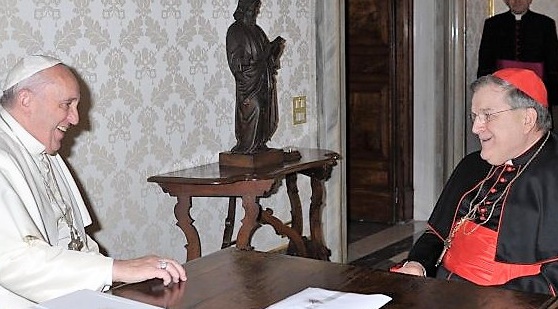
There was a reason for this: the cardinal was once the highest judge of the Church after the pope. Two years earlier, in early November 2014, shortly after completion of the First Family Synod, he served as President Apostolic Signatura of the Supreme Court, was dismissed by Pope Francis and demoted to cardinal protector for Malta. An office with prestige but no influence on Church leadership. The reason for the punitive measure was the cardinal's resistance to the papal line to the remarried divorced.
At the end of 2016, the cardinal was in a very weak position. In September Burke had together with three other cardinals signed and transmitted to the Pope, the Dubia (doubt) on the controversial post-synodal letter Amoris laetitia. Since Francis refused to answer, the cardinals made their questions public in November of the same year. There was a fire on the roof and the four signatories were subjected to numerous hostilities.
On December 1, 2016, Francis issued instructions to the cardinal for Grand Master Festing to act "resolutely" against infiltration. Francis said literally:
"If this turns out to be the case, the knights, who may be members of such organizations, movements and associations, are to be asked to withdraw their affiliation because this is incompatible with the Catholic faith and religious order."
And about the distribution of contraceptives, he said:
“It is also particularly important to ensure that the initiatives and aid agencies of the Order do not use and disseminate methods and means that contradict the moral law. If this problem has occurred in this area in the past, I hope that it can be completely resolved. I would honestly not like it if some high-ranking officers - as you yourself told me - although they knew about this practice, especially about the distribution of contraceptives of all kinds, did not take action to put an end to it."
Grand Master Festing, with the Pope's letter in hand, challenged Grand Chancellor von Boeselager on December 6, 2016, in the presence of the cardinal protector. There was a violent conflict in which Boeselager denied the allegations. Cardinal Burke commented in February 2017 on the clash between Grand Master and Grand Chancellor with the words:
"Whoever allows the distribution of contraceptives should also take responsibility for it."
Boeselager didn't. There was a break. Festing accused his chancellor of betraying him and disregarding the Church's teaching. Since Boeselager refused to resign, the Grand Master dismissed him in accordance with the Constitution.
The Vatican Course
Boeselager rushed to the Vatican to protest what would be irrelevant from a formal legal point of view since the Order of Malta is sovereign. The reality is different, however, since every Maltese knight is also Catholic, and as such owes the Pope obedience.
The deposed Grand Chancellor, well networked with the Vatican State Secretariat, let his relations play. The State Secretariat mobilized for him and Pope Francis suddenly no longer remembered his instructions from December 1. All of this was a misunderstanding, Cardinal Secretary of State Pietro Parolin criticized the Grand Master in a letter dated December 21, 2016. The Pope wanted an outstretched hand and "solutions", but "never said to chase anyone away!"
On December 22, the State Department put in the name of Francis, a commission of inquiry one with a mandate to investigate the dismissal Boeselager as a Grand Chancellor. The procedure was shaken by lawyers: a sovereign state sets up a commission to check the legality of the head of government of another sovereign state.
At least three out of five members of the commission were personal friends and business partners of Boeselager. This made it clear from the start what kind of result was desired. This was also confirmed in the choice of words: The Vatican did not speak of a “Boeselager case,” but of a “crisis in the leadership of the Order”.
Even in the Order of Malta, people understood: Suddenly it was no longer about the head of the Grand Chancellor, but the Grand Master. These therefore repeatedly asked to be received by the Pope in audience in order to correct the facts and to show the incredible events that were taking place. In Santa Marta, however, people turned deaf. The Grand Master addressed the Pope written statements and documents that should have provided evidence, while he accused the papal commission of inquiry of "partiality." Cardinal Burke, at least Cardinal Protector of the Order, said a few months later: The "conflict of interest" of some members of the commission of inquiry appointed by the Pope "is important for the crisis of the Order, that must be very clear." It was "very strange that three [out of five members of the commission of inquiry] were directly involved in the contributions to the order," who had to investigate the removal of the Grand Chancellor and made the recommendation to reinstate him. With regard to the millions in the Swiss trust account, there is no clarity as to who the donor is, where the money comes from, how the money is managed,“ and that is not a good thing.
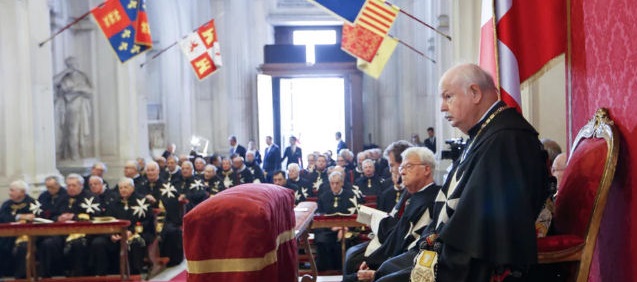
Historian Roberto de Mattei wrote on January 11 about the behavior of Pope Francis and the Vatican Secretariat:
"Let's summarize: For those who violate God's law and natural law, there is dialogue and the outstretched hand. For those who defend the faith and Catholic morality, the stick of the political commissioner and the commission of inquiry is ever ready."
The papal Coup
It was not until the evening of January 24 that Francis let the Grand Master come to him. The encounter was brief and painful. Festing, who had hoped to answer the Pope's questions, did not speak. Francis presented him with a fait accompli. He demanded the resignation of the Grand Master, reinstated Boeselager as Grand Chancellor and annulled all decisions of the Order's government since 6 December. Francis did not care about the sovereignty of the Order. "The Pope demanded it that way," Fra Festing said after the disappointing meeting.
Cardinal Burke remained formally in office, but was effectively stripped of all duties. Francis appointed Angelo Becciu, then substitute for the Cardinal Secretary of State, a special delegate. Instead of Burke, he took over the Pope's representation in the order. The name also only vaguely concealed the fact that he had the powers of an apostolic commissioner.
The coup d'état was carried out, and it was actually one, because the Order of Malta is a sovereign state in the sense of international law, the grand master and prince its head of state. Cardinal Burke said in an interview in early April 2017 about the events in the order:
"Very strange things are happening."
On April 29, 2017 the Great State Council of the Order met under the chairmanship of the papal special delegates to clarify the succession. Three days earlier, Francis had written to the members of the Council of State. The letter affirmed Becciu's powers while was no request to purge the Order of Freemasons.
Archbishop Becciu, on behalf of the Pope, had prohibited the deposed grand master, although a knight of the Order, from participating in the election chapter. Another illegal act among many. The excitement in the Order was so great that at the last moment Fra Festing was allowed to return to Rome.
However, the Grand Master was not chosen. The Grand Prior of Rome, Fra Giacomo Dalla Torre del Tempio di Sanguinetto, was elected governor for one year.
The House of Cards
In order to silence unpleasant press reports, Boeselager filed a complaint against various media in Spring 2017. The action, which was obviously intended to be intimidating, turned out to be a boomerang. The Hamburg Regional Court found that Boeselager was responsible for the distribution of contraceptives in conflict areas, and any of his statements to the contrary did not meet the truth. But that was the main point of conflict in the argument with the Grand Master. Since then it has been clear that Boeselager apparently had also betrayed Pope Francis, Fra Festing was right to dismiss the Grand Chancellor, but Pope Francis was wrong to dismiss Grand Master Festing.
But those who hoped that the Vatican would revise their position after the verdict quickly found themselves disappointed. Perfect facts had been created, and it stayed that way. In addition to the questions of right and wrong and truth and lie, another aspect obviously played an even greater role: interests. This means not only, but also the mysterious millions on a Swiss account.
Henry Sire aka "Marcantonio Colonna" himself, a Knight of Malta and author of the sensational book, The Dictator Pope, which was published in the fall of 2017, expressed his suspicion. Pope Francis may have deliberately played two sides against one another in order to spark a power struggle, to exacerbate it and then to decide. That this face off of different positions of the moral teaching and Francis appearing as the agent on the side of laissez faire AGENT, is no coincidence in the overall context. Real conservatives and traditionalists risk having to meet the same conclusion with Francis.
The New Grand Master
On May 2, 2018, the assembled full Council of State again, and this time was able to make the choice. The previous governor, Fra Giacomo Dalla Torre del Tempio di Sanguinetto, was elected 80th Grand Master and Prince. He was advertised as a compromise candidate: no English, no German. However, Fra Dalla Torre was the preferred candidate for the “German” parliamentary group. Writing about the election on May 4, 2018, Franca Giansoldati in the Rome newspaper Il Messaggero wrote:
“A kind of palace conspiracy culminated in unprecedented interference by the Vatican, which led to breaks, doubts and suspicions among the knights as to whether the transition [the dismissal of Grand Master Festing in late January 2017] had violated the order's sovereignty and autonomy. The doubt also occurred on Wednesday morning, when 54 voters were called to choose the new grand master from a tripartite proposal the previous day (Fra Giacomo Dalla Torre, Fra Carlo Ippolito and Fra Pierre de Bizemont) when the Pope's envoy, Msgr Angelo Becciu, burst into the assembly in the Villa Magistrale. Nobody expected it, at least not for this moment. He delivered the papal greetings, assessed various pros and cons and wished a good work. Then a special thank you to Dalla Torre for his work as governor in this difficult time. The impression of some knights: In their opinion, the presence of the papal special envoy was designed to indirectly apply pressure to voters.”
The Maltese had a Grand Master again, but since the fall of Grand Master Festing, the really strong man in the order is Grand Chancellor Boeselager. Francis can rely on the order today because Boeselager is indebted to him. Henry Sire calls such dependencies the preferred means of Pope Francis to create "loyalties" and to bind people to himself.
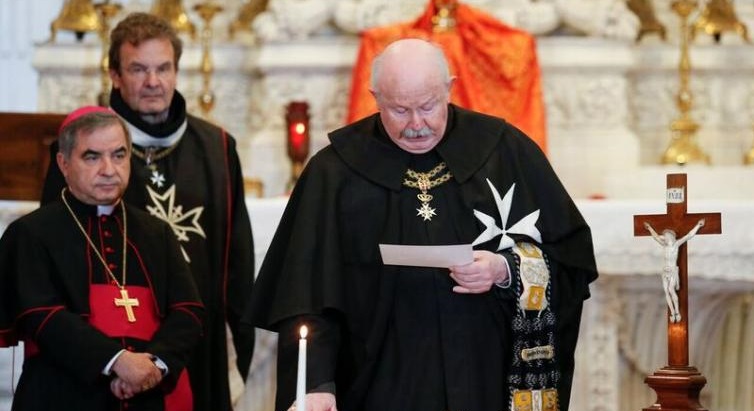
The Downhill Path
Since then, the Order of Malta has been increasingly transformed into a humanitarian NGO, pays homage to political correctness and steers into an identity crisis. Boeselager's new agenda for the order is "Migration", a topic that is particularly precious to Francis, the internationalist left and the globalist elite.
Even homophilia arrived at the time-honored Order of knights in 2019. It is not on the official website of the religious order, but on the Grand Priory of Rome. In a press review, an article of the newspaper appeared in La Repubblica, as it is said of Pope Francis, it is the only newspaper he reads regularly. The article reports on a Roman comic festival on women's rights and “gender issues” of all sexual inclinations by creating “new images of contemporary heroines, lesbian love stories and female friendships.” The studied philosopher and psychologist Mauro Faverzani added:
"This is complemented by the expressions of unrestricted and total agreement with the statements of Pope Francis, with special attention to the issues that are particularly important to him. They are an expression of a recovered idyll after the storms that took place a few years ago and led to a 'revision' of the Sovereign Order of Knights and Hospital of Saint John. ”
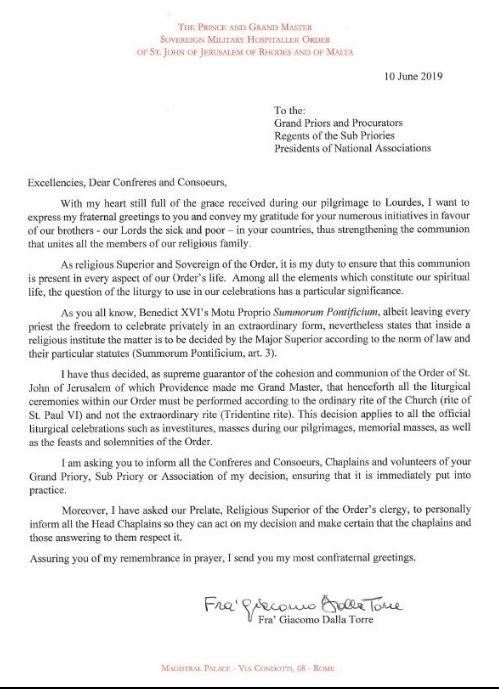
On June 10, 2019, the otherwise inconspicuous new Grandmaster Dalla Torre took a swing. He forbade any liturgical celebration of the Order in the Immemorial Mass of the Roman Rite. The order corresponds to an unconditional ban on the traditional Rite on all levels of the order.
Maria Guarini, Director General of the library of the Italian Ministry of Communications and theologian, wrote on her blog Chiesa e Postconcilio:
"It is a decision that shows an increasingly widespread aversion to the traditional Roman Rite, and whose terse motivation is to 'not displease the Pope'."
The Order did not really come to rest because the peace that was achieved was partly enforced. The English religious Order, one of six major priorities, has been kept in check since the coup. Until then, most of its vocations came from it. It has been treated "like a leper" for three years, according to Vaticanist Marco Tosatti in July 2019.
Henry Sire became even clearer in a comment. He accused the new Grand Master Fra Giacomo Dalla Torre of being “a puppet in the hands of the German parliamentary group”. With whom you talk about the new Grand Master in the Order, says Sire, everyone says the same thing:
"Everyone says he is a very good person, he is a good religious, but ..."
Tosatti added: "Those who know him say that many of his decisions are not exactly in line with his views."
The allusion should also refer to the manifesto to mint the future of the Order of Malta that Boeselager presented for another five years on the occasion of his confirmation as Grand Chancellor. In it he announced the dialogue with the representatives of Islam, the fight against climate change, greater attention to the role of women and the harmonization of norms for professional knights with canon law, a point that aims at a profound "reform" of the order in order to rebuild its standard constitution (the order has three levels: the knights like Festing and Dalla Torre belong to the first level, but Boeselager belong to the second level). Grand Chancellor Boeselager and Grand Master Dalla Torre knew that there could be no question of everyone in the order approving of such an agenda.
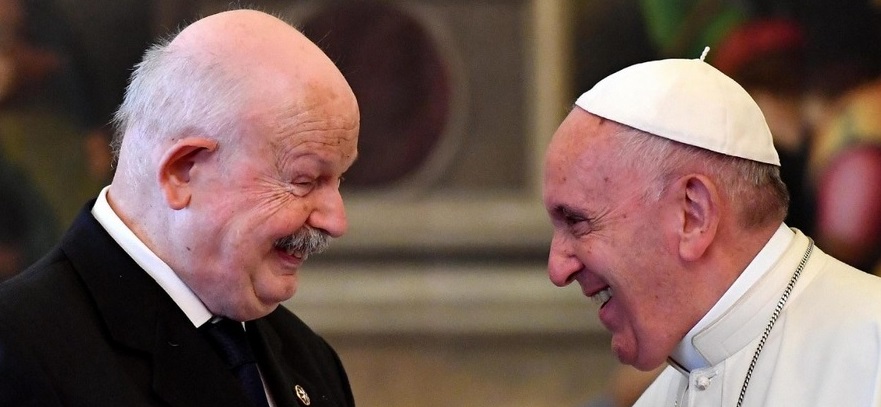
The grand master died yesterday in Rome at the age of 75 after a lackluster tenure at the head of the oldest order of chivalry. The 80th Grand Master is dead while the 79th Grand Master is still alive. A Grand Master, like the Pope, is elected for life. The situation is reminiscent of the parallel between the two popes, and the current death of the reigning grand master before that of the resigned is considered a mega-disaster for parts of the papal court, transferred to the ruling and emeritus popes.
With the death of Grand Master Dalla Torre, the question of the alignment of the order is open again. Who will succeed him? Who can prevail? How much will the Vatican interfere this time?
Text: Giuseppe Nardi
Image: SMOM / MiL / NBQ / GN (screenshots)
Image: SMOM / MiL / NBQ / GN (screenshots)
Trans: Tancred vekron99@hotmail.com
AMDG
AMDG


That is a very impressive account. Thank you
ReplyDeleteInteresting story.
ReplyDeleteThey NEED to elect a priest ordained before June 1968.
-Andrew
Andrew,
ReplyDeleteThe Grand Master can only be elected from among the religious of the Order - so it would be another "Fra" somebody.
10-4 Driver thank you.
Delete-Andrew
How did he die?
ReplyDeleteHe died from throat cancer.
ReplyDeleteDonnacha,
ReplyDeleteI've read previously that Boeselager and the rest of the German faction want to change the requirements of who can be a Grand Master. The German faction, apparently, has very few eligible to join the 1st Level of Knights due to it's requirement of taking a religious vow. They are, at PF's direct and indirect involvement, many other ongoing changes. The following Wikipedia entry indicates some of the visible changes.
In May 2017, the Order named Mauro Bertero Gutiérrez, a Bolivian member of the Government Council, to lead its constitutional reform process.[41][42][43] And in May 2018 when a new Grand Master was elected, Francis extended Becciu's mandate indefinitely.[44][45] In June 2017, in a departure from tradition, the leadership of the Order wore informal attire rather than formal wear full dress uniforms to their annual papal audience.[46] When the Order's General Chapter met in May 2019, as it does every five years, the participants included women for the first time, three of the 62 participants.[47]
John F. Kennedy
No matter how bad a man religiously this guy was, or a robot of Pope Francis, he must have suffered a tremendous amount with throat cancer. Cigars and cigarettes, as well as alchohol are some of the prime causes, ad well as being exposed to asbestos and other chemicals (insecticide, etc.). But it is one of the most painful forms of cancer, and bad as this man might have been, I would not have wished that on him or anyone.
ReplyDeleteRIP.
Damian M. Malliapalli
Tancred--
ReplyDeleteYou nailed this headline! Fra Festing never never but NEVER should have handed his head over to Antipope Francis. @DMM, agreed on gruesome death--my wife's immediate reaction was: "He must've done something really bad."
Banning the Old Mass? I'd say that--not to mention carrying out any orders of that snake Becciu or of the charming Argentine puppetmaster masquerading as vicar of Christ--qualifies.
"vicar of Christ"
ReplyDeleteExcept for Benedict XVI who actually deserved the title, no Pope since Vatican II deserved it, and scum Bergoglio actually renounced it.
Damian M. Malliapalli
Here is a new twist to this story... https://gloria.tv/post/majN2H9SqwiQ2Mbcqeiu1vv4V
ReplyDelete"The death of the Grand Master of the Order of Malta, Fra’ Giacomo Dalla Torre del Tempio di Sanguinetto, is clouded in mysteries, writes MarcoTosatti.com (May 5).
In the late morning of April 29, when Dalla Torre was dying in the ARS Medica clinic in Rome, the Order’s capitulars received an email with three attachments:
1. A letter by the Grand Commander asking to pray for Dalla Torre.
2. The convocation of an Extraordinary November General Chapter of the Order for the approval of the controversial “reform,” signed on that day by Dalla Torre.
3. A letter by Grand Chancellor Boeselager informing that the draft "constitutional reform" was sent to the Vatican.
Tosatti asks how Dalla Torre was able to sign the convocation while dying and thus putting his successor under constraint, all the more that the draft of the “reform” was not even seen by the other professed knights.
For Tosatti this reeks of palace intrigue. He adds that the exact hour of Dalla Torre’s death was never indicated as is customary, but only a generic “after midnight.”
In the background of this, Tosatti sees a fight between the professed knights who want to keep the Order as a religious institution, and the arrogant German axis which wants to turn the Order into a secularist NGO.
Now, the Germans could use Dalla Torre’s death as a bargaining chip to go through with their “reform” because Dalla Torre “has wanted it so much.”